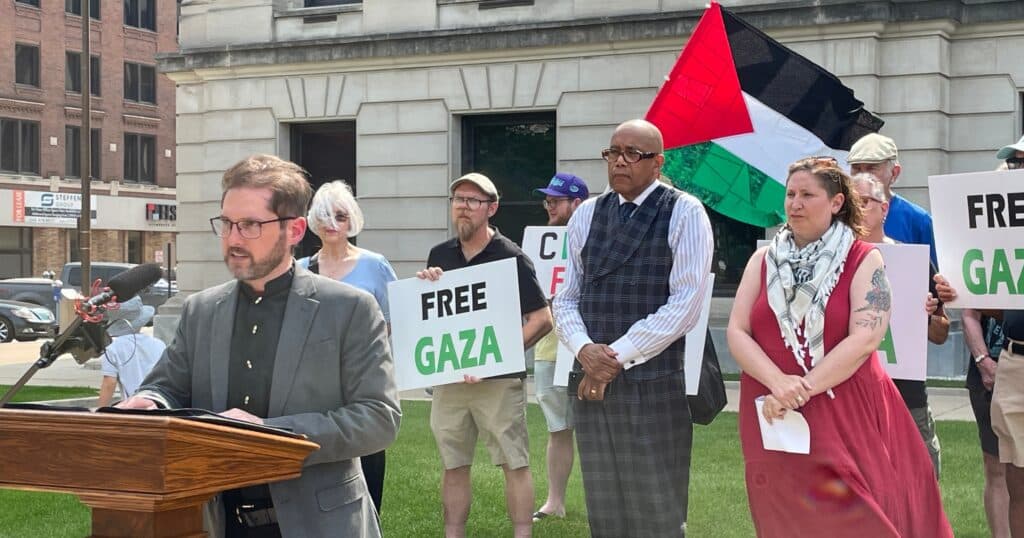There is no Peace
Each day we awaken to the news of more deaths resulting from armed conflicts around the world. The violence of war and civil unrest is escalating along with the alarming death toll. The loss of life is staggering with 233,597 people dead from armed conflicts in 2024. The war in Ukraine was the deadliest in 2024, with 67,000 reported deaths, while 35,000 deaths were reported in the Palestinian territories of Gaza and the West Bank.
Gaza. Ukraine. Sudan. Haiti. Myanmar. Democratic Republic of Congo. These are but a few of the 110 areas of conflict being monitored by the Geneva Academy of International Humanitarian Law and Human Rights. Most of these will not make the news, the loss of human life dismissed over time as insignificant or explained away with little meaning. And, most of these have been on-going for years, with recent escalation drawing new concerns to areas where unrest was already brewing.
The conflict between Ukraine and Russia began in 2014 and escalated in 2022 with the Russian invasion of Ukraine. Three years later, millions are displaced and hundreds of thousands are dead. The cry for cease fire continues with no lasting peace sustained.
In Gaza, the conflict dates back to 1948 and has escalated over the years since, with the Israeli occupation of the Palestinian territories. The latest conflict began in October 2023 followed by protracted and ongoing violence. The cry for cease fire continues, with attempts at cease fire proving unsustainable.
These two areas are most heavily covered by the news, making it easier to find information about what is happening. As violence escalates globally, public concern for other areas of conflict seems to reflect the attention being given by the 24/7 news cycle, which is at best limiting and often biased regarding the people and places that are featured. The media attention given to most conflicts is fleeting at best, with little sustained engagement or options for stopping the death, destruction, and violence being broadcast. Faith communities are advocating for peace in the world, yet peace seems to be elusive with additional challenges for those surviving in places of conflict daily.
There is no shortage of organizations monitoring and addressing the conflicts around the world, others engaged in peace efforts, and yet others trying to find solutions to prevent war. And yet, peace remains elusive for billions whose lives continue to be disrupted by acts of violence that are politically supported and motivated.
The United Nations charter states its primary purpose:
To maintain international peace and security, and to that end: to take effective collective measures for the prevention and removal of threats to the peace, and for the suppression of acts of aggression or other breaches of the peace, and to bring about by peaceful means, and in conformity with the principles of justice and international law, adjustment or settlement of international disputes or situations which might lead to a breach of the peace.
This is a tall order, one it cannot achieve by itself. The church as a member of civil society has to be present in this multilateral space contributing to the peace building efforts that are needed globally. Commitments to peace locally and nationally must include national and international efforts to advocate for peace. As this summary list of armed conflicts makes clear, the work toward peace and the flourishing of all people requires collaborative engagement:
More than 45 armed conflicts are currently taking place throughout the Middle East and North Africa in the following territories: Cyprus, Egypt, Iraq, Israel, Libya, Morocco, Palestine, Syria, Turkey, Yemen and Western Sahara.
More than 35 non-international armed conflicts are taking place in Burkina Faso, Cameroon, the Central African Republic (CAR), the Democratic Republic of the Congo, Ethiopia, Mali, Mozambique, Nigeria, Senegal, Somalia, South Sudan and Sudan.
Asia has 21 non-international armed conflicts involving 19 armed groups. These are happening in Afghanistan, India, Myanmar, Pakistan and The Philippines. Two international armed conflicts – between India and Pakistan, and between India and China – are also taking place in the region.
In Europe, four out of seven conflicts are military occupations: Russia is currently occupying Crimea (Ukraine), Transdniestria (Moldova), as well as South Ossetia and Abkhazia (Georgia), while Armenia is occupying parts of Nagorno Karabakh (Azerbaijan). Europe is also the theatre of an international armed conflict between Ukraine and Russia, and of two non-international armed conflicts in Ukraine.
Today, as we awaken once again to the acts of war and violence in the world, we pray for peace in our world. We pray for the end to conflicts. We pray for an end to violence for all whose lives are impacted and void of peace today. We hope that peace will be evident in the world one day.
Content on ucc.org is copyrighted by the National Setting of the United Church of Christ and may be only shared according to the guidelines outlined here.
Related News
‘I’ll eat when they eat’: Indiana pastors participate in nationwide fast for Gaza
“I’ll eat when they eat.” The Rev. Sara Ofner-Seals shared these words in an open...
Read MoreEmergency resolutions for Synod consideration address immigration, humanitarian funding, genocide in Palestine
Five new resolutions will come before delegates at the upcoming General Synod 35 in Kansas...
Read MoreUnquestioning and Unchanging
I spoke with someone who has different views than I do about the current political realities...
Read More


